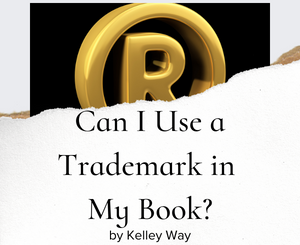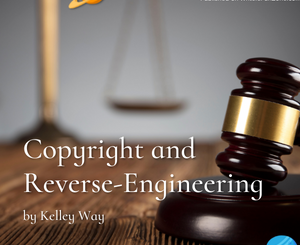Fair Use Frequently Asked Questions by Kelley Way
 Let’s welcome back monthly columnist Kelley Way as she shares with us “Fair Use Frequently Asked Questions.” Enjoy!
Let’s welcome back monthly columnist Kelley Way as she shares with us “Fair Use Frequently Asked Questions.” Enjoy!
***
What Can You Tell Me About Fair Use?
Fair use is a subject that comes up a lot with my copyright clients. Some of them think it’s a magic bullet that will defend them against all lawsuits. (It’s not.) Others are simply confused and want to know more about what it is and how it works.
Here are some fair use frequently asked questions (FAQ):
What is fair use?
In copyright law, anyone who uses a copyrighted work without permission has infringed on that person’s copyright.
Fair use is the exception to that rule.
Congress recognizes that some uses serve a public benefit and that public benefit outweighs the harm to the copyright owner.
In addition, the use may be something that the copyright owner doesn’t want to give permission for – for example, a parody work that makes fun of the copyrighted work.
So Congress wrote the fair use doctrine into the Copyright Act: if the use qualifies as fair use, then there’s no infringement, even if all the elements of infringement are met.
How do I know if my use qualifies as fair use?
Unfortunately, there is no “bright-line” rule that tells you what is fair use and what isn’t.
Some uses are presumed to be fair (such as criticism, commentary, teaching, and news reporting), but those uses can still be considered infringing under the right circumstances.
Fair use is decided on a case by case basis, which is another way of saying that you won’t know for sure if your use qualifies until after the lawsuit is over.
Is it fair use if I only use a certain number of words/seconds from the [book/poem/song/video]?
How much you take from the copyrighted work is a factor that the courts consider, but it is only one factor among several.
To see the test that the courts use to decide fair use, please look at last month’s article, “The Do’s and Don’ts of Using Content from the Internet.”
Is it fair use if I give credit/attribution to the copyright owner?
What about if I say I don’t have the rights to the work?
Short answer: no.
Longer answer: Whether or not you give credit, or admit that you don’t have the rights, is not a factor the courts consider when deciding fair use (at least not officially.)
However, some copyright owners are more lenient if they are given credit, so it’s not a bad idea.
A better idea is to ask permission or use the content the owner has released for others to use freely.
Is it okay to write fanfiction?
For those unfamiliar with the term, fanfiction is when fans of a book, movie or television series write stories that take place in the universe of the original work.
For example, if someone wrote a story about a new student at Hogwarts or the untold adventures of the U.S.S. Enterprise.
Now, fanfiction creates an interesting dilemma for copyright owners.
On the one hand, creating new works is an exclusive right under copyright law, so fanfiction is copyright infringement.
On the other hand, the fanfiction authors are huge fans of the copyright owner’s work, and going after them could alienate the copyright owner’s fan base.
Most copyright owners turn a blind eye unless they feel a particular piece of fanfiction is a problem. Usually that happens when the fanfiction author is trying to make money from their fanfiction, or readers/viewers think the fanfiction is a legitimate part of the canon.
Of course, this is only the tip of the iceberg. If you have more questions about fair use, you are welcome to email me at kaway@kawaylaw.com.
***
More resources on literary law: https://writersfunzone.com/blog/resources/resources-books-on-literary-law
***
ABOUT THE AUTHOR
Kelley Way was born and raised in Walnut Creek, California. She graduated from UC Davis with a B.A. in English, followed by a Juris Doctorate. Kelley is a member of the California Bar, and an aspiring writer of young adult fantasy novels. More information at kawaylaw.com.







